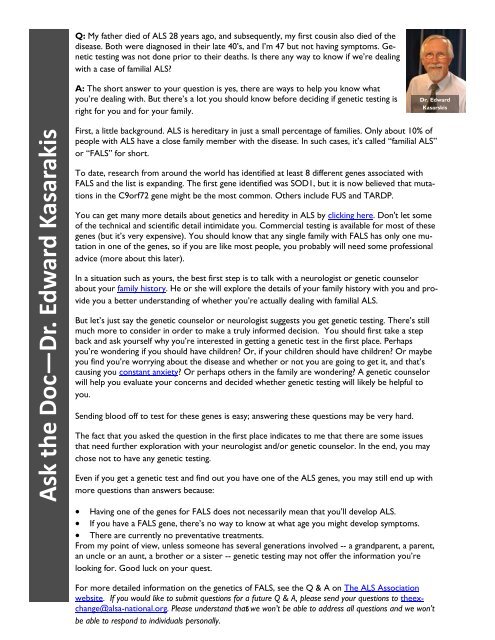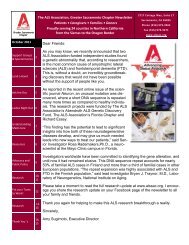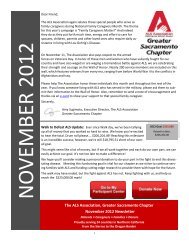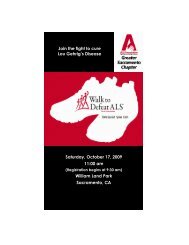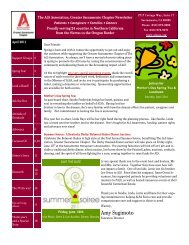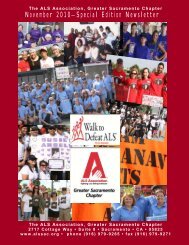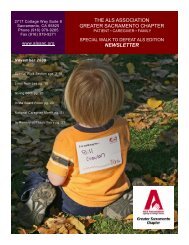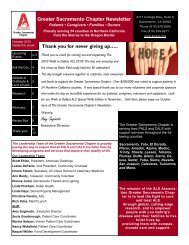October 2012 - The ALS Association Greater Sacramento
October 2012 - The ALS Association Greater Sacramento
October 2012 - The ALS Association Greater Sacramento
Create successful ePaper yourself
Turn your PDF publications into a flip-book with our unique Google optimized e-Paper software.
Ask the Doc—Dr. Edward Kasarakis<br />
Q: My father died of <strong>ALS</strong> 28 years ago, and subsequently, my first cousin also died of the<br />
disease. Both were diagnosed in their late 40’s, and I’m 47 but not having symptoms. Genetic<br />
testing was not done prior to their deaths. Is there any way to know if we’re dealing<br />
with a case of familial <strong>ALS</strong>?<br />
A: <strong>The</strong> short answer to your question is yes, there are ways to help you know what<br />
you’re dealing with. But there’s a lot you should know before deciding if genetic testing is<br />
right for you and for your family.<br />
Dr. Edward<br />
Kasarskis<br />
First, a little background. <strong>ALS</strong> is hereditary in just a small percentage of families. Only about 10% of<br />
people with <strong>ALS</strong> have a close family member with the disease. In such cases, it’s called “familial <strong>ALS</strong>”<br />
or “F<strong>ALS</strong>” for short.<br />
To date, research from around the world has identified at least 8 different genes associated with<br />
F<strong>ALS</strong> and the list is expanding. <strong>The</strong> first gene identified was SOD1, but it is now believed that mutations<br />
in the C9orf72 gene might be the most common. Others include FUS and TARDP.<br />
You can get many more details about genetics and heredity in <strong>ALS</strong> by clicking here. Don't let some<br />
of the technical and scientific detail intimidate you. Commercial testing is available for most of these<br />
genes (but it’s very expensive). You should know that any single family with F<strong>ALS</strong> has only one mutation<br />
in one of the genes, so if you are like most people, you probably will need some professional<br />
advice (more about this later).<br />
In a situation such as yours, the best first step is to talk with a neurologist or genetic counselor<br />
about your family history. He or she will explore the details of your family history with you and provide<br />
you a better understanding of whether you’re actually dealing with familial <strong>ALS</strong>.<br />
But let’s just say the genetic counselor or neurologist suggests you get genetic testing. <strong>The</strong>re’s still<br />
much more to consider in order to make a truly informed decision. You should first take a step<br />
back and ask yourself why you’re interested in getting a genetic test in the first place. Perhaps<br />
you’re wondering if you should have children? Or, if your children should have children? Or maybe<br />
you find you’re worrying about the disease and whether or not you are going to get it, and that’s<br />
causing you constant anxiety? Or perhaps others in the family are wondering? A genetic counselor<br />
will help you evaluate your concerns and decided whether genetic testing will likely be helpful to<br />
you.<br />
Sending blood off to test for these genes is easy; answering these questions may be very hard.<br />
<strong>The</strong> fact that you asked the question in the first place indicates to me that there are some issues<br />
that need further exploration with your neurologist and/or genetic counselor. In the end, you may<br />
chose not to have any genetic testing.<br />
Even if you get a genetic test and find out you have one of the <strong>ALS</strong> genes, you may still end up with<br />
more questions than answers because:<br />
Having one of the genes for F<strong>ALS</strong> does not necessarily mean that you’ll develop <strong>ALS</strong>.<br />
If you have a F<strong>ALS</strong> gene, there’s no way to know at what age you might develop symptoms.<br />
<strong>The</strong>re are currently no preventative treatments.<br />
From my point of view, unless someone has several generations involved -- a grandparent, a parent,<br />
an uncle or an aunt, a brother or a sister -- genetic testing may not offer the information you’re<br />
looking for. Good luck on your quest.<br />
For more detailed information on the genetics of F<strong>ALS</strong>, see the Q & A on <strong>The</strong> <strong>ALS</strong> <strong>Association</strong><br />
website. If you would like to submit questions for a future Q & A, please send your questions to theexchange@alsa-national.org.<br />
Please understand that 5 we won’t be able to address all questions and we won’t<br />
be able to respond to individuals personally.


